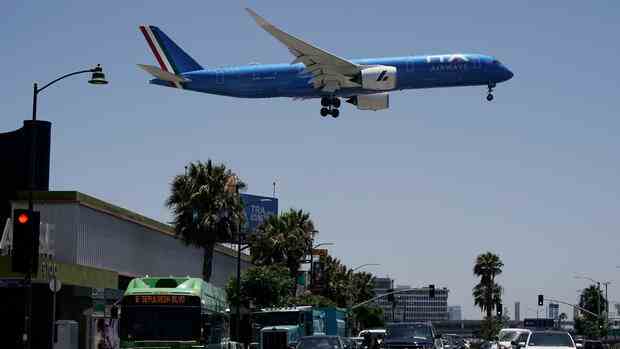If the Italian airline is to be in the black soon, the Lufthansa management must take a very close look at the route network.
(Photo: AP)
Frankfurt Lufthansa boss Carsten Spohr finally seems to have reached his goal. Even if the final contract for joining Alitalia’s successor ITA has not yet been signed, nothing stands in the way of taking over the airline with its home hub in Rome.
The Italian government wants Europe’s largest airline group, and the unions probably want them too. And the EU Commission may impose a few requirements for some routes. But the cartel watchdogs in Brussels will be happy if the ongoing issue of Alitalia/ITA can finally be checked after years of government subsidies.
So everything good? Not at all. As understandable as it is to strive for a greater presence in Italy and an airline of its own in the country, the risks are just as great. Now it is important that the top management around Spohr succeeds in the integration. Because that is anything but a matter of course.
Italy is undoubtedly an important aviation market in Europe. It is true that it is important to get involved there. Just like the decision not to leave this market to a competitor. Also, ITA is not very big as an airline. Integrating them into the Lufthansa Group is hardly more difficult per se than it was to integrate Brussels Airlines or the Austrian AUA after the takeover. Even the purchase price will probably remain manageable.
Top jobs of the day
Find the best jobs now and
be notified by email.
But the ITA deal cannot be compared to previous Lufthansa transactions. In Belgium and Austria, management could rely on stable governments that kept their word. Nevertheless, it still takes a long time to turn Brussels and AUA into real gems for the group. After all: AUA probably closed the past financial year with a profit – something that the core brand Lufthansa did not succeed in doing.
ITA is not comparable to the acquisitions of Brussels and AUA
The situation in Italy is very different. Prime Minister Giorgia Meloni has made concessions to Lufthansa in a way that no Italian head of state has done in many years. Just a few months ago, hardly anyone would have believed the right-wing politician capable of doing this. Italy will not give away its airline to foreign countries, especially not to the Germans, Meloni had rumbled during the election campaign.
In case of doubt, the group must be prepared to withdraw from Italy if everything turns out differently in Rome than expected.
But that is exactly what is worrying. How reliable are commitments from a government pursuing nationalist policies? What happens if the current alliance in Rome falls apart again, as has so often happened in the country’s history? Nothing is certain in Italy, that much is certain.
It will soon become clear how resilient what has been agreed is. ITA is in the red. Lufthansa cannot accept long-term losses in Italy. Management needs the money to pay off the debt. And it needs the means to stabilize its own operations and increase the workforce.
So the Lufthansa leadership must start quickly to rebuild ITA so that the new acquisition can finance itself. Lufthansa has to look at the existing route network and fleet planning. Painful cuts are to be expected and could cause an uproar among Italian unions. The employee representatives may have wanted Lufthansa as the new owner of ITA. But that doesn’t mean they will stay tame forever.
If ITA is to be a successful acquisition, the Lufthansa management in Italy must show more toughness than they did with the previous acquisitions. That also means: When in doubt, the group must be prepared to withdraw from Italy if everything turns out differently in Rome than expected.
More: Airbus A380: Why the super jumbo is making a comeback.
